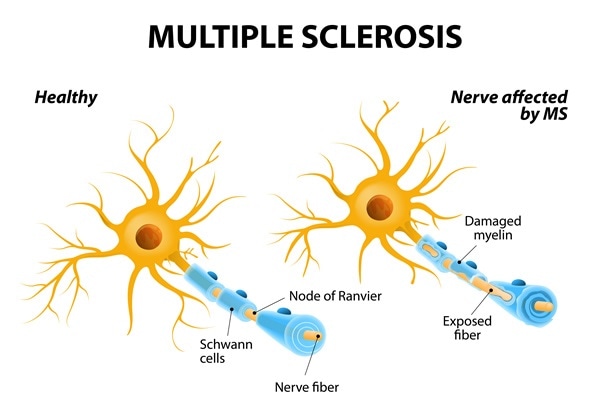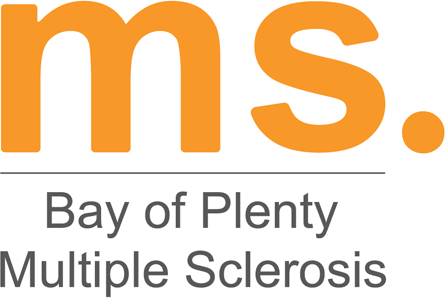What is MS?
MS is a disorder of the central nervous system (CNS) which includes the brain, spinal cord and optic nerves.
 The CNS is responsible for our conscious and unconscious functioning, including movement and the response to sensations such as sight, touch and hearing. It directs these functions by sending its instructions in the form of electrical impulses to the appropriate sites along nerve fibres.
The CNS is responsible for our conscious and unconscious functioning, including movement and the response to sensations such as sight, touch and hearing. It directs these functions by sending its instructions in the form of electrical impulses to the appropriate sites along nerve fibres.
Nerve fibres are coated in a protective insulating covering called the myelin sheath—this serves a very similar function to the coating around electrical wires. Myelin is important in speeding electrical conduction along nerve fibres and in insulating nerve fibres from one another.
What does it mean?
The term multiple sclerosis refers to multiple areas of scarring (sclerosis) scattered throughout the brain and spinal cord. These scars are the result of healing patches of inflammation that are the basic cause of damage to nerve fibres and of the suddenly appearing symptoms that are referred to as an attack, exacerbation or relapse.
Patches of inflammation heal spontaneously over several weeks or months when symptoms may resolve completely or residual impairment may result, if they do not. The inflammation causes damage particularly to the insulating myelin sheath covering nerve fibres, but also damages the nerve fibres (axons) themselves.
In MS, the typical damage is often referred to as "demyelination”. The nature of the symptoms and their severity depends partly on the site of the patch of inflammation (or lesion) and partly on its nature and intensity.
Who gets MS?
Using data from the MSNZ funded Prevalence Study (2006) and MS Incidence Study (2012-14) we estimate that about one New Zealander in every thousand has MS. Thus, there are just over 4000 poeple in New Zealand diagnosed with MS.
It is more common in:
Yound Adults - Symptoms , usually appear between ages of 20 and 50 with a peak in the early 30's. Currently in New Zealand the average age is 37 years old.
Women - women are affected approximately three times more often than men.
Caucasians - MS is more prvalent in Caucasians (people with Ancestry from Northern Europe), than any other racial group. It is rarely found in Maori and Polynesian People and is uncommon is Asian people.
The prevalence in New Zealand is approximately 1 per 1000 with the annual incidence being around 134 people per year.
People in cooler climates -generally MS is much higher in regions such as the South Island of NZ, Scotland and Canada than it is in tropical and sub tropical areas.
Near Relatives - those with close relatives with MS have a slight increased risk. Having a first degree relative (mother, father, sibling) with MS increases the chances of having it from approximately 1 in every 1000 people to 30 in every 1000. But it is important to note that the great majority of people with an affected first degree relative do not develop MS.
MS is not contagious or infectious; it is not possible to contract it from close contact with a person with MS
What can I expect?
The course of MS varies widely from person to person. Some people will only ever experience mild symptoms over their lifetime while others will have relapses followed by incomplete remission when disability may worsen in a stepwise fashion with each relapse experienced. A number of people experience slowly progressive, worsening of disability over many months or years. There is uncertainty how much of this progressive process is due to low-grade inflammation and how much to loss of previously damaged nerve fibres.
What causes MS?
The cause of MS is still not known.
Both genetic and environmental factors are important, but how they interact to produce episodes of localised inflammation over many years is not clear.
MS is widely regarded as an autoimmune disease. Here the body produces a misdirected immune system attack on its own tissue, in this case the myelin sheath that protects the axons, but that has never been firmly established. A reaction to a virus hidden in the CNS has been long suspected, but also not proven.
In persons with MS, the immune system appears to be normal in all other respects. MS is not a hereditary disorder in the sense of being passed directly from parent to child. The increased risk in close family members is not attributable to a single gene, but most likely related to several genes who function is not well understood - some of these probably influence the body's immune reactions.
A striking environmental feature is the increase in prevalence of MS in higher latitudes both above and below the equator. In NZ for example, the prevalence of the South Island is approximately twice that in the upper half of the North Island. The pattern of migration from Northern Europe may contribute to that distribution, levels of sunlight exposure and Vitamin D, or other undetermined environmental factors. Among many possibilities, exposure early in the life to a virus infection that has a long term effect on immune repsonses is also being considered. However, none of the numerous viruses suspected can be directly linked at present.
Further info:
What Causes MS? - National MS Society
Is MS genetic- MS Trust
Is MS hereditary or not - MS Trust
Risk of developing MS- MS Trust

